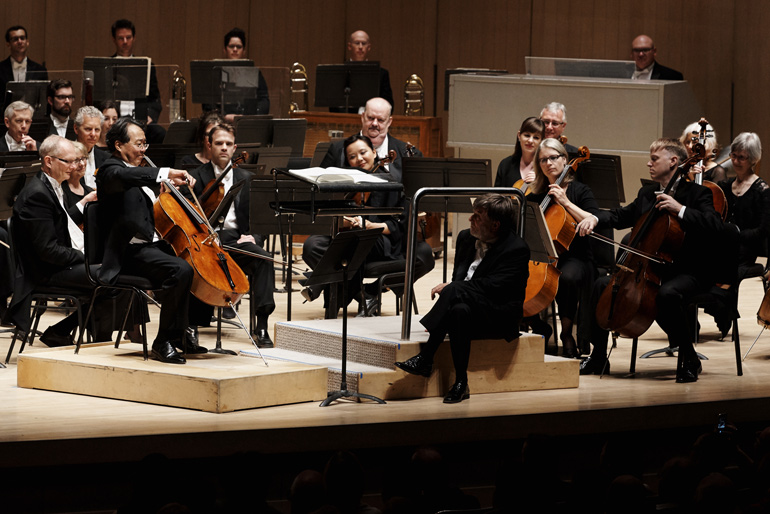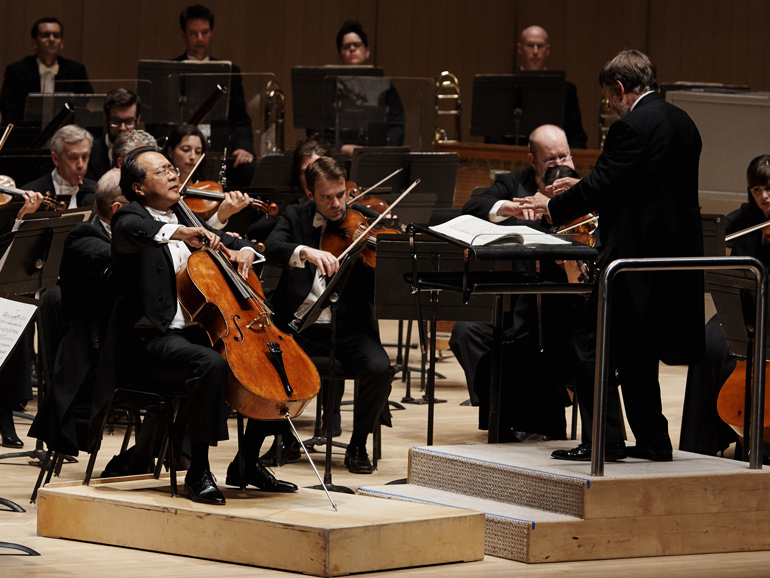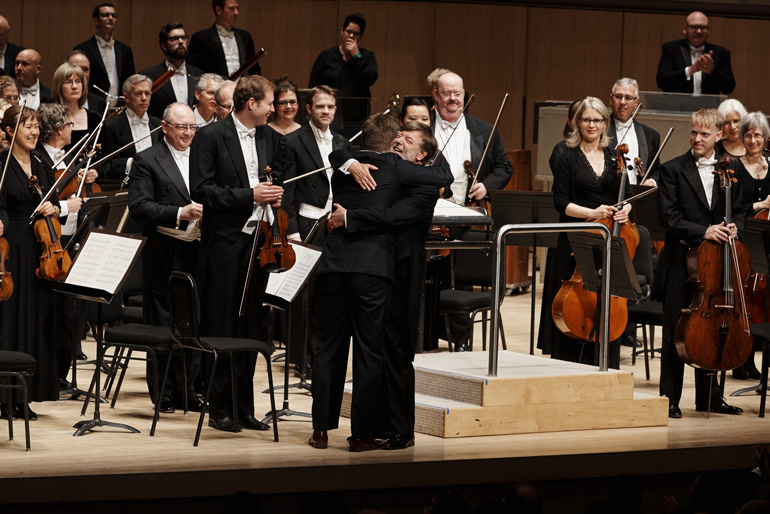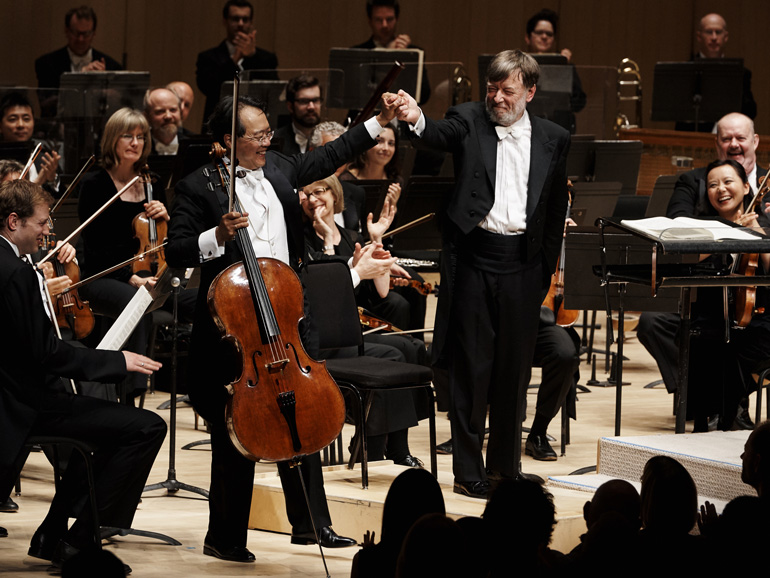
The TSO, with Sir Andrew Davis, Yo-Yo Ma, and the Toronto Children’s Chorus at Roy Thomson Hall, Friday, May 29.
Forty years: It could have been a birthday, as Yo-Yo Ma suggested Friday on the stage of Roy Thomson Hall. Sir Andrew Davis, 71, does not look his age, or even act it, especially when the music on the lectern requires (or inspires) a high degree of rhythmic animation.
Yet the third of three programs celebrating the long association of Sir Andrew with the Toronto Symphony Orchestra offered a range of emotion and scale. I felt in general that the introverted moments were more memorable.
Of these, there are plenty in Elgar’s Cello Concerto, an elegiac and personal work of 1919 in which the solo instrument often speaks in whispers. Soft-toned despite the magnitude of his reputation, Ma has a penchant for finely-spun long notes and deploys the Italian trifecta of legato, rubato and vibrato more liberally than any of his rivals. His brinksmanship was remarkable near the end of the piece when Elgar brings the music to a standstill.
Somehow the structure of the music survived. One senses that Elgar conceived of the conductor and orchestra as a support network of close friends. This is how Sir Andrew and the players came across.
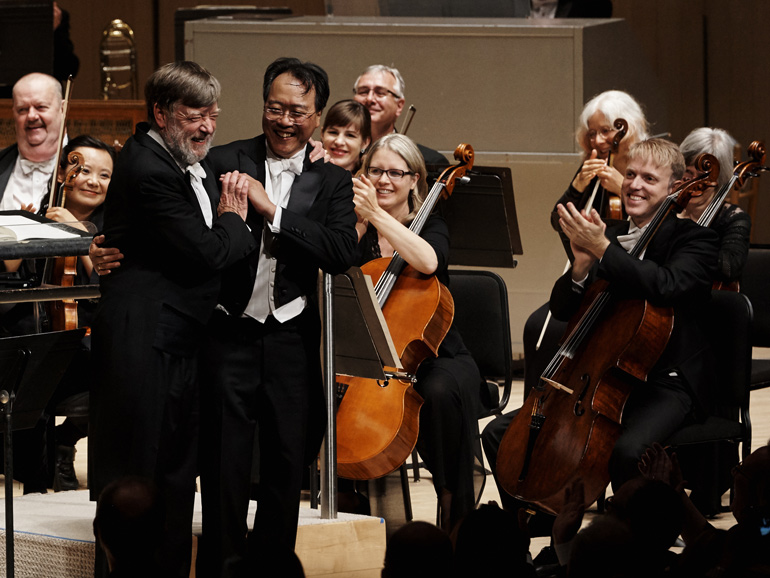
There was much applause (including a round after the scherzo). As a tribute to the man of the hour, Ma played Elgar’s salon favourite Salut d’Amour in an arrangement involving the front-desk cellos. Touched and nonplussed, Sir Andrew sat obediently on the podium, much to the merriment of the sold-out crowd.
After intermission, we heard Holst’s The Planets. There were brilliant interludes, inevitably, and fine solos (notably by the euphonium). The most palpably atmospheric stops on the tour were Mercury, wonderfully light and effervescent, and its gloomy opposite, Saturn.
Venus was too quick and foursquare to be seductive, and the full-out martial passages of Mars lacked the organic sonority of the TSO at its best. Jupiter also seemed coarsely jolly. And while to use the Toronto Children’s Chorus for the offstage fade out of Neptune was a convenient solution, I think Holst knew what he was doing when he asked for women.
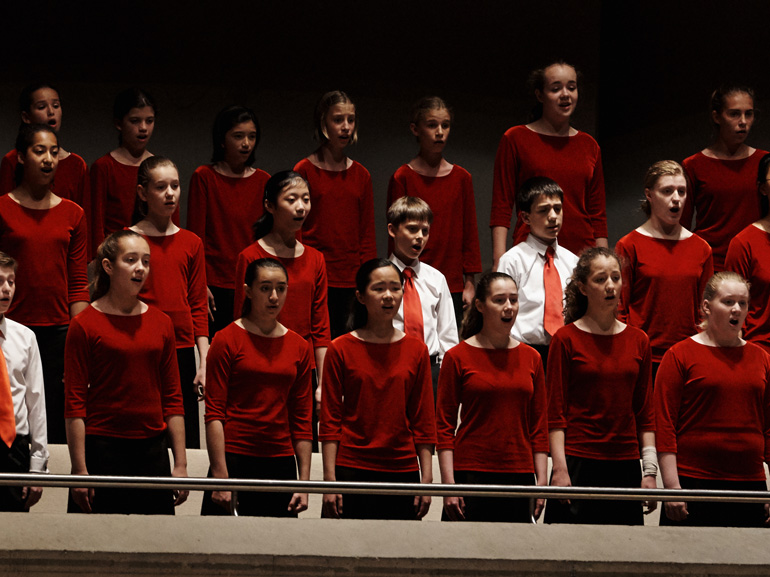
The concert began with this choir (as prepared by Elise Bradley) in the premiere of The Stolen Child by Ed Frazier Davis, the Chicago-based son of the conductor (who referred to him as “Edward” in a spoken introduction). A ten-minute setting of a poem by Yeats, it proved to be more compelling for its colourful orchestration than its ungainly melodic lines. Little of the tonal variety promised by the program note materialized.
Prior to this concert were two that included Mussorgsky’s Pictures at an Exhibition in the spectacular Ravel orchestration. Big solos – by the saxophone in the Old Castle and the tuba in Bydlo – were admirably warm on Wednesday, but many supporting performances were no less worthy. Brass players made a cohesive sound in the Great Gates of Kiev (after retaining their nobility in the go-for-it final pages of Berlioz’s Le Corsaire).
Before intermission Louis Lortie addressed himself to Liszt’s Piano Concerto No. 1, 37 years after playing it with the TSO and Davis on tour in China. The manner was authoritative, even in poetic interludes, and the fingers were as fine as ever. Chopin’s Etude Op. 10 No. 4 was the dazzling encore.
Starting this concert was La Serenissima, Sir Andrew the composer’s 1981 tribute to Venice. After luminous beginnings touched by Debussy and a more stalwart tribute to Monteverdi, we paid other visits, including one to St. Mark’s Square, where outdoor cafe bands were in competition. Many were the postcards in this album: Sir Andrew could get half way through an opera with all the material. Still, it was lovingly played by musicians who continue to regard their conductor laureate and former music director with affection.
- SCRUTINY | Moussa Concerto Sounds Strong In Toronto Symphony Orchestra Premiere, Paired With Playful Don Quixote - April 4, 2024
- SCRUTINY | Esprit Orchestra At Koerner Hall: Ligeti 2, Richter No Score - April 1, 2024
- SCRUTINY | Sibelius & New Cello Concerto By Detlev Glanert Offers A Mixed Bag From The TSO - March 28, 2024
#LUDWIGVAN
Want more updates on Toronto-centric classical music news and review before anyone else finds out? Get our exclusive newsletter here and follow us on Facebook for all the latest.
- SCRUTINY | Moussa Concerto Sounds Strong In Toronto Symphony Orchestra Premiere, Paired With Playful Don Quixote - April 4, 2024
- SCRUTINY | Esprit Orchestra At Koerner Hall: Ligeti 2, Richter No Score - April 1, 2024
- SCRUTINY | Sibelius & New Cello Concerto By Detlev Glanert Offers A Mixed Bag From The TSO - March 28, 2024

